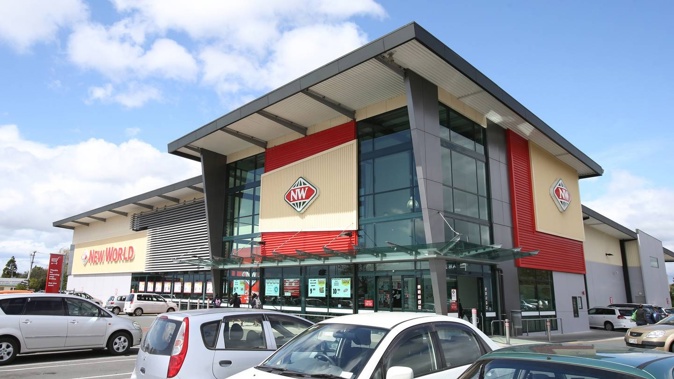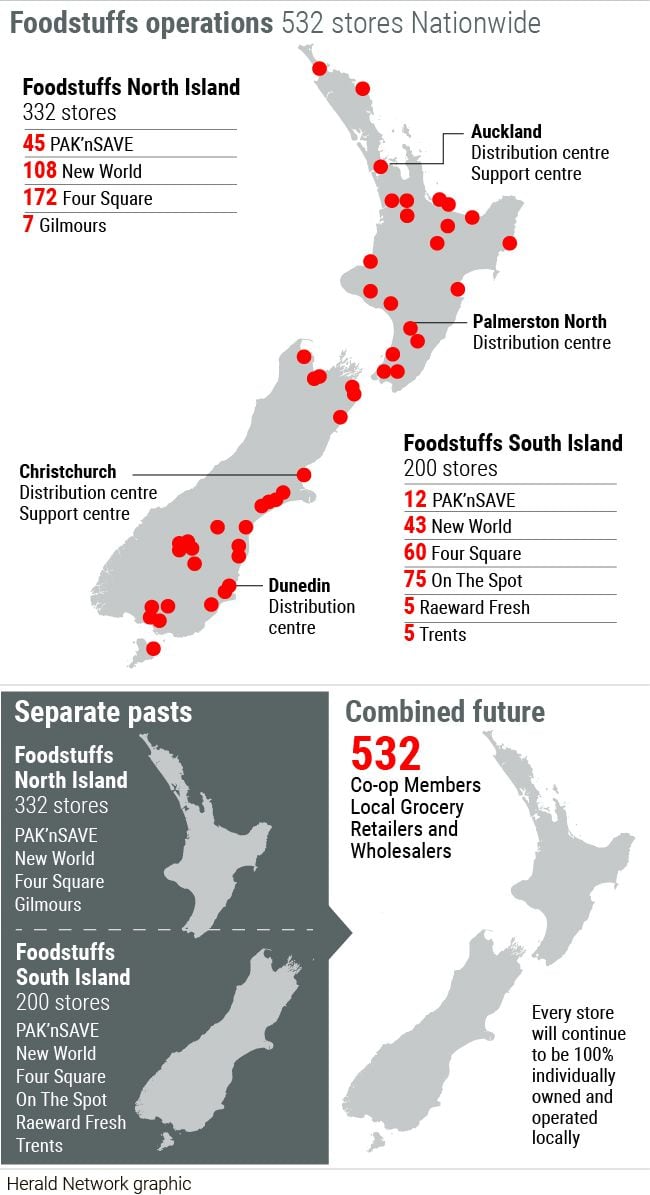
One half of New Zealand’s supermarket duopoly, Foodstuffs, is to apply to the Commerce Commission to merge its North Island and South Island co-operatives into a single national business.
The consolidation proposal is expected to raise significant market competition questions and a strong response from grocery sector participants.
The competition watchdog is expected to closely scrutinise the move for its potential impact on consumers and grocery suppliers. The test will be whether the merger lessens competition in the sector.
The proposal comes as the country’s first grocery watchdog begins work in the $25 billion supermarket sector, following a Government-ordered market study of competition in the sector by the Commerce Commission, which led to the passage of the new Grocery Industry Competition Act in July.
Foodstuffs operates the New World, Pak’nSave and Four Square and Gilmours grocery retail outlets in the North Island. Their combined revenue was $9.8b in the 2023 financial year.
In the South Island, Foodstuffs operates Pak’nSave, New World, Four Square, Raeward Fresh, On the Spot and Trents stores. Combined revenue in FY23 was $3.8b.
In total, Foodstuffs has 532 owner-operated stores throughout the country, with the South Island and North Island entities operating as separate co-operatives, owned by owner-operators in those islands.
The other half of the supermarket duopoly, and Foodstuffs’ main competition, is Australian-owned Woolworths, currently rebranding from Countdown.
Spokesman for the proposal, Foodstuffs North Island chairman Dean Waddell, told the Herald the benefits for all New Zealanders of the quest for more efficiency would be significant.
Waddell declined to share cost savings figures.
Pressed on how the proposal would benefit customers at the checkout, he said consumers had three major demands of retailers: “They want better value for money, they want us to invest in innovation... and they want the customer experience.”
He added: “By being more efficient, we will be able to invest more heavily in these things. So yes, being more efficient will mean savings at the checkout.”

“Ultimately there will be more value for customers at the checkout.”
“The [Commerce Commission] market study made it very clear to our industry we needed to be more efficient. Consumers wanted more value at the checkout and more investment... we’ve been seriously considering [since] what is the best thing for both organisations.
“Bringing them together to take out the cost and complexity of having two support structures supporting the same brands across New Zealand is the right thing to do.”
Waddell said the two co-operatives were in the early stages of talks with the Commerce Commission, and planned to make a formal application for clearance before Christmas.
/cloudfront-ap-southeast-2.images.arcpublishing.com/nzme/ELJQ2CK3PITJQI5EZKLVBWIZSM.jpg) Dean Waddell owns a Tauranga Foodstuffs brand store and is chairman of the board for Foodstuffs North Island.
Dean Waddell owns a Tauranga Foodstuffs brand store and is chairman of the board for Foodstuffs North Island.
Foodstuffs North Island chief executive Chris Quin would be CEO-designate of the new business after the merger, which co-operative members will vote on in mid-2024. Foodstuffs South Island chairman Russell McKenzie will chair the proposed new single board.
The merger proposal would raise a “strong response” among stakeholders such as suppliers and could expect to be closely examined by the Commerce Commission, a senior competition lawyer told the Herald.
The North Island and South Island co-operatives were currently in competition on the “buy [supplier] side”, the lawyer said, and presumably would be in competition on the “sell side” but for a presumed contract, arrangement, or understanding not to enter each other’s geographic market.
This presumed contract indicated a potential or likely “cartel provision” in the law.
“While there may be a ‘collaborative activity’, given market concentration issues, there must be a real question as to whether the existing arrangements could substantially lessen competition,” the lawyer said.
Both co-operatives appeared to be actively expanding with big roll-outs of new stores, which must increase barriers to market entry, the lawyer said.
/cloudfront-ap-southeast-2.images.arcpublishing.com/nzme/JD7BM5OPQGS7PIKQJWCGRY6LHU.jpg) Chris Quin, CEO of Foodstuffs North Island, would head up the proposed merged Foodstuffs entity. Photo / Michael Craig
Chris Quin, CEO of Foodstuffs North Island, would head up the proposed merged Foodstuffs entity. Photo / Michael Craig
Foodstuffs was also active in commercial land acquisition markets.
“Any merger would be a permanent change in market structure... it would further increase market power on the demand side as there would presumably be an increase in centralisation of purchasing to obtain further efficiencies - getting better prices from suppliers, ie wealth transfer,” the lawyer said.
Other likely concerns about the merger included horizontal and vertical issues for own brands and conglomerate effects.
Every single impacted market needed to be looked at, and further regulation considered, the lawyer said.
“There will be a temptation to think of this as ‘intrabrand’ and therefore not an issue but that’s not the right, nor the Commerce Commission, approach.
/cloudfront-ap-southeast-2.images.arcpublishing.com/nzme/FV62ECEL6FDVBB4IVWGK3PAS3E.jpg) Countdown is rebranding to Woolworths. Photo / Jesse Wood
Countdown is rebranding to Woolworths. Photo / Jesse Wood
“It could be seen as looking very cynical when the [grocery sector policing] regime is just starting and National Party comments indicating the new Government will look at regulation closely.”
Foodstuffs’ Waddell, owner-operator of the Pak’nSave supermarket on Tauranga’s Cameron Road, said under the present, separate co-operative structure, there was duplication of boards of directors, leadership teams, IT platforms and support functions.
“We are doing things twice in both islands.”
A merger would increase Foodstuffs’ capital spend as currently the two co-operatives invested in the business separately. There would be no change to Foodstuffs’ national food brands, Waddell said.
He couldn’t comment on whether the merger would mean any loss of jobs. Foodstuffs North Island employs 2295 people and the South Island co-operative 2000.
The number of independently-owned stores would not change.
All supply chain networks would remain and operate as they do now.
“This is the final and fourth merger bringing the independent grocers of New Zealand into one organisation - there was Four Square in the late 1920s, New World in the 60s, and Pak’nSave in the 80s. Those brands have come through co-operatives and all the co-operatives have been using those brands on a national basis,” Waddell said.
Andrea Fox joined the Herald as a senior business journalist in 2018 and specialises in writing about the dairy industry, agribusiness, exporting and the logistics sector and supply chains.
Take your Radio, Podcasts and Music with you









